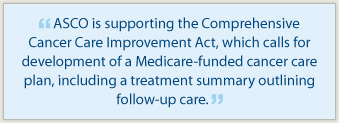 Last August, ASCO issued the policy statement, “Opportunities in the Patient Protection and Affordable Care Act to Reduce Cancer Care Disparities” in the Journal of Clinical Oncology.1 The statement builds on ASCO’s policy on disparities in cancer care released in 2009. It calls on both the oncology community and public policymakers to find ways to improve elements in the Patient Protection and Affordable Care Act signed into law last year, as well as amendments to the Act under the Health Care and Education Reconciliation Act of 2010, with an eye toward expanding access to cancer care to vulnerable population groups that suffer disproportionately from cancer.
Last August, ASCO issued the policy statement, “Opportunities in the Patient Protection and Affordable Care Act to Reduce Cancer Care Disparities” in the Journal of Clinical Oncology.1 The statement builds on ASCO’s policy on disparities in cancer care released in 2009. It calls on both the oncology community and public policymakers to find ways to improve elements in the Patient Protection and Affordable Care Act signed into law last year, as well as amendments to the Act under the Health Care and Education Reconciliation Act of 2010, with an eye toward expanding access to cancer care to vulnerable population groups that suffer disproportionately from cancer.
Opportunities and Limitations
“One of our main recommendations in ASCO’s policy statement on cancer disparities published in 2009 was the need to provide universal health care, and that was essentially established with the passage of Patient Protection and Affordable Care Act,” said Blase N. Polite, MD, Assistant Professor of Medicine, Center for Gastrointestinal Oncology, Center for Interdisciplinary Health Disparities Research at the University of Chicago Medical Center. He is also Chair-Elect of ASCO’s Health Disparities Advisory Group and coauthor of the policy statement. “We felt that now it was important to look at the opportunities and limitations contained in the new law to end disparate outcomes in cancer.”
ASCO’s policy statement calls for several measures to address elements of the health-care reform legislation that may hinder greater access to cancer care for older adults and lower-income and minority groups, including:
- Ending Medicare reimbursement cuts for oncology care. Any additional cuts to Medicare reimbursement for oncology care will cause undue burden for oncology practices, thereby limiting access to care for people with cancer, according to results from a poll ASCO conducted in 2010. In the poll, nearly one-third of respondents said that they would be forced to accept fewer Medicare patients as a result of the proposed sustainable growth rate cuts. Inadequate reimbursement for Medicaid patients may also lead to reduced access to health care for low-income groups. One recommended strategy ASCO makes in its statement is to raise Medicaid reimbursement rates to Medicare levels, similar to the increased reimbursement rates temporarily allowed for primary care physicians under the Affordable Care Act.
“Some of our recommendations for Medicare and Medicaid include considering immediate eligibility for Medicare once a patient is diagnosed with cancer, similarly to what has been done for patients with kidney disease undergoing dialysis treatment,” said Dr. Polite. - Establishing oncology health teams and medical homes. The Patient Protection and Affordable Care Act calls for grants from the U.S. Department of Health and Human Services to develop community-based interdisciplinary health teams that would be coordinated by primary care physicians. While this provision in the law doesn’t specifically address the clinical needs of cancer patients, it provides an opportunity for ASCO members to identify better ways of coordinating their care through so-called oncology medical homes, according to Dr. Polite.
“The way the health-care law is written, it’s very clear that it will be incumbent upon providers to figure out ways to better coordinate patient care, and we think there are a lot of opportunities for oncology practices to think broadly in terms of that care,” commented Dr. Polite. “So the idea of a community oncology home starts with the fact that we realize our patients tend to require a variety of professional services in addition to those provided by their oncology medical team, such as nutritionists, social workers, psychologists, and palliative care physicians. Currently, we’re all paid separately and some of the services are not reimbursed at all,” he said.
“One option we need to consider is how we could bring all of these services under one umbrella, coordinated by the oncologist in consultation with the primary care physician, and combined with the financial flexibility to fund these various services. That is the essence of the medical home. The law as written considers these factors soley from the perspective of the primary care physician, but it does speak to the care of the cancer patient undergoing complex multidisciplinary treatment,” Dr. Polite added. - Expanding health-care coverage to include follow-up diagnostic tests without patient deductibles or copayments. Although the Affordable Care Act requires health insurers to pay for preventive screenings without charging a deductible or copay, the law does not mandate the same provision for follow-up examinations and biopsies.
- Protecting access to clinical trial participation by low-income and minority groups. Although Affordable Care Act regulations require health insurers to cover routine costs associated with clinical trial participation, ASCO is asking for additional steps to ensure greater access to minority and low-income patients, such as funding for the infrastructure needed to collect data on race and ethnicity to address cancer disparities and the development of cancer-specific payment models to reduce disparities in cancer outcomes under the Center for Medicare and Medicaid Innovation.
 Improving long-term cancer survivorship plans. With more than 12 million cancer survivors, according to the latest figures from NCI, there is an increasing need to establish long-term coordinated care. To achieve this goal, ASCO is supporting the Comprehensive Cancer Care Improvement Act, which calls for development of a Medicare-funded cancer care plan, including a treatment summary outlining follow-up care, for each patient.
Improving long-term cancer survivorship plans. With more than 12 million cancer survivors, according to the latest figures from NCI, there is an increasing need to establish long-term coordinated care. To achieve this goal, ASCO is supporting the Comprehensive Cancer Care Improvement Act, which calls for development of a Medicare-funded cancer care plan, including a treatment summary outlining follow-up care, for each patient.
The Next Step
Members of ASCO’s Health Disparity Advisory Group will be bringing their recommendations for improvements to the Affordable Care Act to key members of Congress, to determine how these measures could be incorporated into legislation being written to implement the health-care law.
“ASCO has a very good sense of what a top-flight cancer care system in this country would look like. Substantive discussions about how we get to that top-flight system should be part of any broad-based entitlement reform discussion. To step forward and say cancer is different and that this is the way that cancer care should be delivered in this country is the right thing to do,” said Dr. Polite. ■
Disclosure: Dr. Polite reported no potential conflicts of interest.
Reference
1. Moy B, Polite BN, Halpern MT, et al: American Society of Clinical Oncology Policy Statement: Opportunities in the Patient Protection and Affordable Care Act to Reduce Cancer Care Disparities. J Clin Oncol. August 1, 2011 (early release online).

